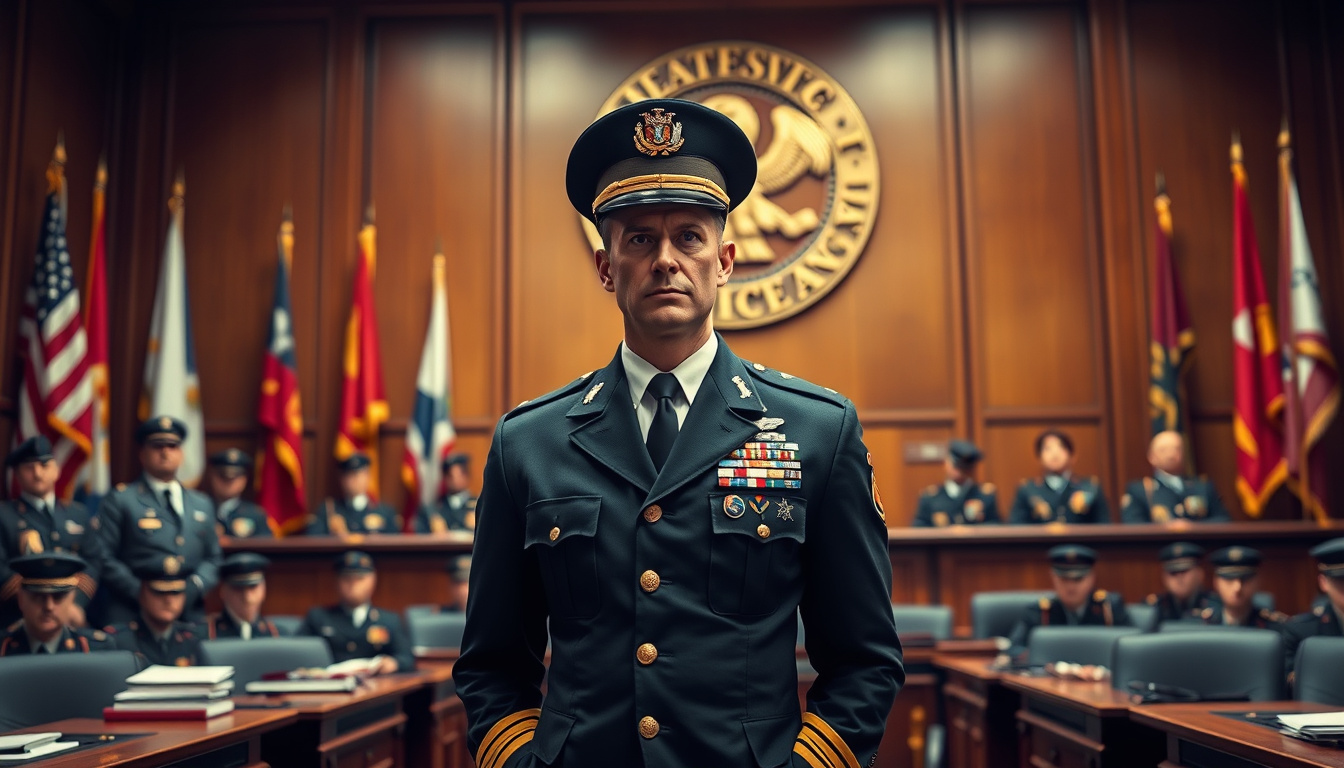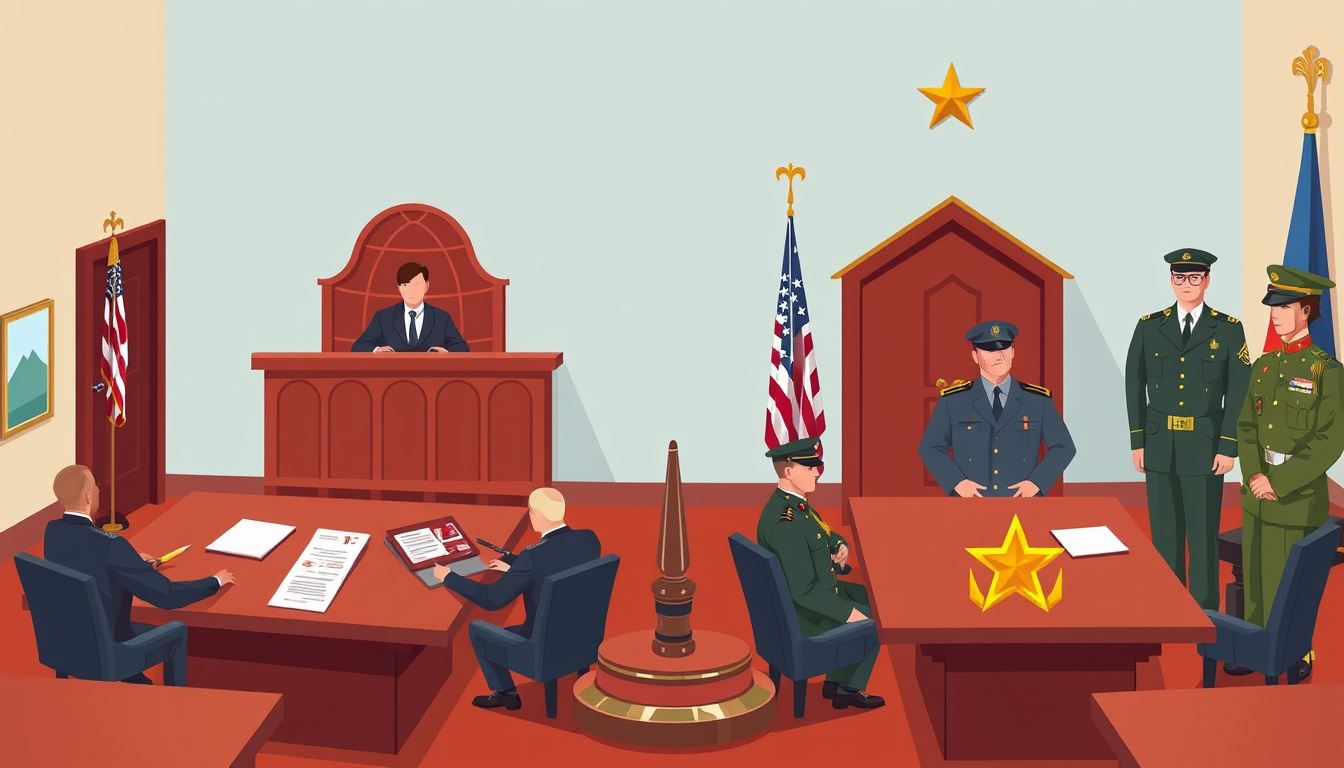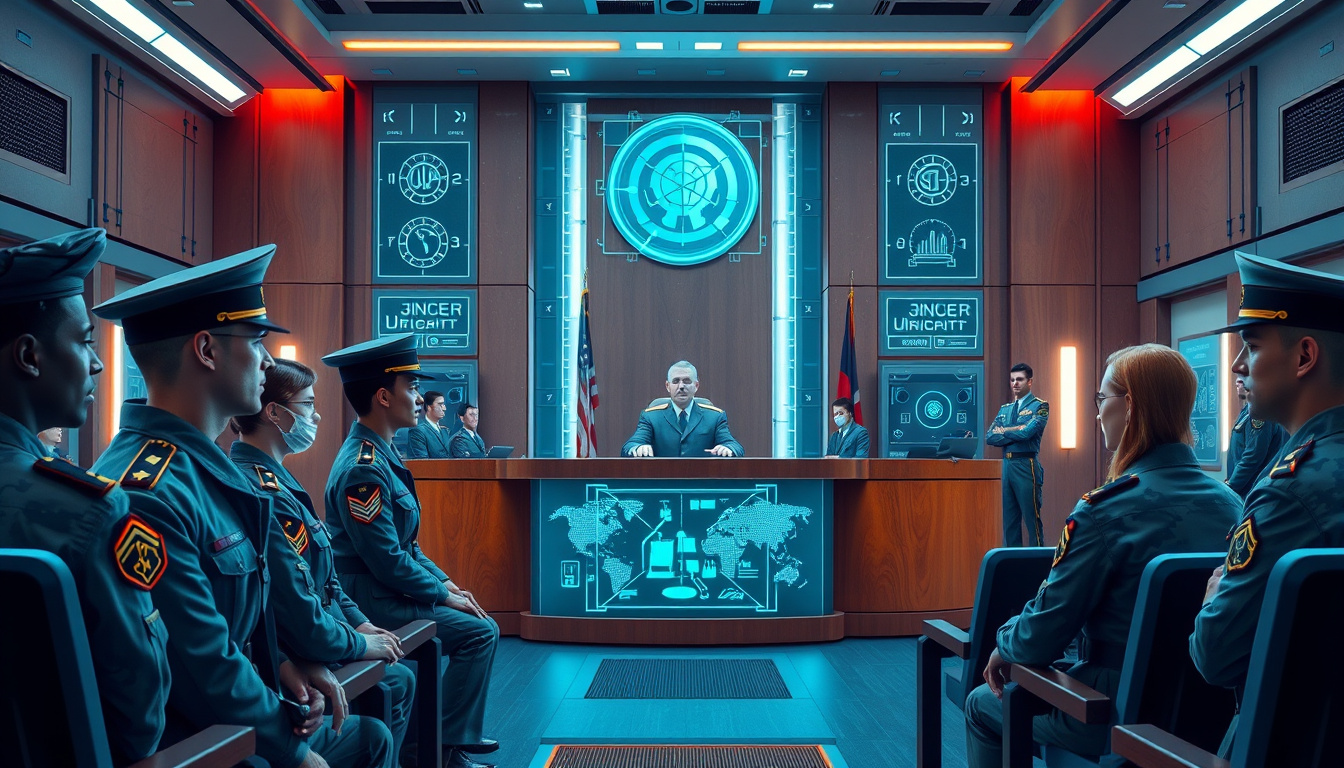When faced with allegations under the Uniform Code of Military Justice (UCMJ), servicemembers and their families may find themselves in an incredibly daunting situation.
Whether it is a court martial, administrative discipline, or administrative separation, understanding the complexities of military law is crucial.
This is where a military lawyer becomes essential.
In this blog article, we will explore the key aspects of military law, the pivotal role of military lawyers, the fundamental distinctions between civil and military law, the types of cases they handle, the qualifications necessary to become a military lawyer, challenges in the field, and what the future may hold for military law.
This comprehensive guide aims to equip servicemembers and their families with the knowledge they need when navigating these difficult circumstances.

Key Takeaways
- Military lawyers specialize in legal issues related to the armed forces.
- They serve as advocates for service members in both courts-marital and administrative hearings.
- Civil and military law differ significantly in structure, regulations, and judicial processes.
- Common cases for military lawyers include criminal defense, administrative separations, and appeals.
- Pursuing a career as a military lawyer requires specific qualifications and training tailored to military contexts.
Introduction to Military Law
### Introduction to Military Law
Navigating the complexities of military law can be daunting, especially for servicemembers and their families who are facing serious situations like court martial, administrative separations, or allegations under the Uniform Code of Military Justice (UCMJ).
Understanding your rights and the legal framework that governs military service is essential.
Whether you are dealing with minor administrative discipline or more severe criminal allegations, having a knowledgeable military lawyer by your side can make a significant difference in the outcome of your case.
Military law encompasses a variety of legal aspects, including the rights of service members, the procedures for handling criminal allegations, and the unique challenges that military families may encounter.
In this blog post, we will delve into the essential elements of military law, the importance of legal representation, and what you need to know if you’re facing a court martial or any administrative discipline.
Role of a Military Lawyer
When facing serious legal challenges such as court martial, UCMJ violations, or allegations of criminal behavior in the military, the role of a military lawyer becomes crucial.
A military lawyer specializes in navigating the complex legal landscape specific to military law, ensuring that servicemembers and their families receive the proper representation and guidance they need during challenging times.
These legal professionals understand the unique aspects of the Uniform Code of Military Justice (UCMJ) and can provide invaluable assistance in defending against accusations that could lead to punitive action.
They help clients understand their rights, prepare for hearings, and strategize effective defenses.
Furthermore, a military lawyer can advise servicemembers on potential administrative discipline or separation, ensuring that members fully grasp the implications of any administrative actions taken against them and how best to respond.
By working with a qualified military lawyer, servicemembers can better navigate the complexities of their cases, protect their careers, and seek the most favorable outcomes.
‘In war, law is not always a part of the equation, but where there is a soldier, there must be a lawyer to ensure justice prevails.’ – Unknown

Differences Between Civil and Military Law
When facing legal challenges such as court martial or allegations under the Uniform Code of Military Justice (UCMJ), it is crucial for military servicemembers and their families to understand the differences between civil and military law.
The military justice system is designed to maintain discipline and order within the armed forces, and it involves a unique set of regulations and procedures that differ significantly from the civilian legal framework.
A military lawyer is essential in navigating these differences, as they are specially trained to handle cases that pertain to military personnel.
One of the primary distinctions lies in the nature of the offenses; military law encompasses actions that may not even be considered illegal in civilian contexts, such as disobeying a superior officer or being absent without leave (AWOL).
Furthermore, the consequences of disciplinary actions in the military can be far more severe than in civilian cases, potentially leading to a dishonorable discharge or confinement.
Additionally, military trials, often conducted in the form of court martials, have their own set of rules of evidence, voting processes, and burdens of proof, which can complicate defense strategies.
Therefore, a military lawyer offers invaluable expertise to servicemembers confronted with these unique legal challenges, ensuring that they receive fair representation and understand their rights under military law.
Common Cases Handled by Military Lawyers
If you or a loved one is facing a court martial, UCMJ proceedings, or any criminal allegations in the military, it’s crucial to understand the types of cases that military lawyers typically handle.
Military lawyers are specialized legal professionals who serve members of the armed forces, ensuring their rights are protected within the military justice system.
Some common cases they deal with include:
1.
Court Martial Cases: Military lawyers represent service members at court martial proceedings, which can involve serious felony charges such as desertion, assault, or drug offenses.
These proceedings are among the most complex legal environments and require a thorough understanding of military law.
2.
UCMJ Violations: The Uniform Code of Military Justice (UCMJ) governs the conduct of military personnel.
Military lawyers help servicemembers accused of UCMJ violations, ranging from minor infractions to serious crimes.
They guide individuals through the investigative processes, potential charges, and resultant penalties.
3.
Administrative Separations: Sometimes, military personnel may face administrative separation, which is a process that can lead to a member’s discharge from service for misconduct or performance-related issues.
Military lawyers assist in ensuring that service members receive due process and proper representation throughout the administrative hearings.
4.
Non-Judicial Punishment (NJP): Also known as Article 15 hearings, NJP is an administrative punishment process where service members can receive disciplinary actions without a court martial.
Military lawyers can represent clients in these hearings to ensure their rights are upheld and that they receive fair treatment.
5.
Appeals and Post-Conviction Relief: If a servicemember is convicted, a military lawyer can help them navigate the appeals process.
This involves challenging the verdict, sentencing, or procedural errors that occurred during the initial trial or hearings.
In light of these common cases, having skilled military legal representation can make a considerable difference in the outcome of proceedings.
Whether you’re dealing with charges under the UCMJ or facing potential separation from the military, engaging a knowledgeable military lawyer is essential for safeguarding your rights and future.

Career Path and Qualifications for Military Lawyers
When considering a career as a military lawyer, one must first understand the unique qualifications and path required to serve in this vital role.
Military lawyers, often referred to as Judge Advocates (JAG), are commissioned officers in the armed forces who provide legal advice and representation in a host of judicial matters, including court martial proceedings, administrative discipline cases, and individual servicemembers’ legal rights under the Uniform Code of Military Justice (UCMJ).
To become a military lawyer, candidates typically need a law degree from an accredited law school, followed by the successful completion of the Bar exam in the state where they are seeking to practice.
Beyond these prerequisites, potential military lawyers should also be in good standing with the American Bar Association and possess strong leadership, communication, and analytical skills.
After obtaining a law degree, candidates can apply for the JAG Corps through their branch of service—such as the Army, Navy, Air Force, or Marine Corps—where they must pass a rigorous selection process, including physical fitness assessments and interviews.
Once selected, candidates undergo specialized training that includes military law, criminal law, and trial advocacy.
This training equips military lawyers with the necessary tools to effectively represent their clients in situations involving court martial, administrative separation, or any allegations regarding violations of the UCMJ.
The path of a military lawyer is not just a career; it’s a commitment to uphold the law and serve those who serve the nation.
Challenges Faced by Military Lawyers
Military lawyers face a unique set of challenges distinct from those encountered in civilian legal practice.
One significant hurdle is their requirement to understand not just the broader American legal framework but also the nuances of the Uniform Code of Military Justice (UCMJ).
The high-pressure environment of military court-martials demands that military lawyers navigate complex legal procedures swiftly while ensuring the rights of servicemembers are protected.
Furthermore, military lawyers often must tackle cases involving sensitive issues that can impact the careers, reputations, and lives of military personnel and their families.
These challenges are compounded by the emotional weight of representing individuals who may be facing serious allegations, such as criminal charges, administrative discipline, or possible administrative separation.
In these situations, military lawyers must effectively communicate, provide counsel, and advocate for their clients amidst the rigid structure of military justice, all while balancing their duty to uphold military orders and standards.

Conclusion and Future of Military Law
Navigating the complexities of military law can be a daunting task for servicemembers and their families, especially when faced with serious issues such as court martial, UCMJ violations, or administrative separations.
The stakes are high, and the consequences can be life-altering, making it imperative to seek the guidance of a qualified military lawyer.
As the landscape of military law evolves, so too does the role of legal advocates in safeguarding the rights of service members.
Looking ahead, we may see reforms that offer greater protections and a more nuanced understanding of the unique challenges faced by military personnel.
Ongoing legal education and awareness should be prioritized to empower servicemembers to understand their rights and options.
Ultimately, the future of military law hinges on collaboration between legal professionals, the military community, and policymakers to ensure justice and fair treatment for all who serve.
Frequently Asked Questions
What is the role of a military lawyer?
A military lawyer specializes in legal matters relating to military personnel and operations.
They provide legal representation and advice on a range of issues including court-martial proceedings, military discipline, administrative actions, and legal rights of service members.
How does military law differ from civil law?
Military law is specifically designed for armed forces and includes unique regulations and codes such as the Uniform Code of Military Justice (UCMJ), whereas civil law pertains to legal matters in civilian life.
Key differences include how offenses are prosecuted, the rights of defendants, and the types of punishment available.
What kinds of cases do military lawyers typically handle?
Military lawyers may handle cases related to court-martials, non-judicial punishment, military administrative actions, disciplinary issues, and appeals, as well as providing counsel on benefits, contracts, and family law matters pertinent to service members.
What qualifications do I need to become a military lawyer?
To become a military lawyer, one must earn a law degree (JD) from an accredited law school, pass the bar exam, and have completed the necessary training specific to military law, often through a commission in the armed forces or joining the Judge Advocate General’s (JAG) Corps.
What challenges do military lawyers face?
Military lawyers often confront unique challenges such as the high pressure of representing clients in serious legal matters, navigating the complexities of military justice, and dealing with the emotional and psychological impacts of military life on service members.
If you or a loved one is under investigation or facing charges under the UCMJ, don’t wait to protect your future. Contact Gonzalez & Waddington, Attorneys at Law. Our battle-tested military defense lawyers have successfully defended service members worldwide against the most serious military offenses. Call us today for a confidential consultation and put our elite military defense attorneys in your corner.


